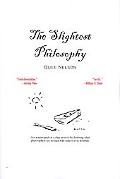

 |

|

The average rating for The Slightest Philosophy based on 2 reviews is 4 stars.
Review # 1 was written on 2009-01-19 00:00:00 Christopher Clements Christopher ClementsUsing a wonderful dialogic style the author raises doubts about the viability of philosophical skepticism. The result is an analysis of skepticism, its' nature and history all done in a clever way that helps the reader understand the arguments. The book provides detail analysis in a rarely used approach to philosophy that nonetheless has influential antecedents. In doing so the analysis presented appeared quite comprehensive to this reader who, while fairly well-read in general philosophy, has not studied this topic in detail. Thus I was impressed with the thoroughness of the author's approach to the topic. This is serious philosophy done well without being dry and abstruse. A great read. |
Review # 2 was written on 2008-02-11 00:00:00 Mr Alcock Mr AlcockLet me know if you have any information about this author, because he/she is fairly insightful. I'm only about halfway through as of today. It's divided into 1) a long-essay and 2) Socratic dialogue. The author takes a look at where Postmodern thought has arrived, critiqueing such old guys as Hume, Hegel, Kant, and even Descarte and Montaigne and Rorty a little bit too. The book repeatedly presents Kant and Hume's conclusion about the impossibility of knowledge by empiricism/rationalism. All empirical data is suspect because there is nothing in the mind that was not first in the senses, and no reason to believe you are not merely a brain in a vat somewhere hooked up to electrodes, a computer feeding your senses so that you THINK you are alive on the third planet of the Sol System in an arm of the Milky Way Galaxy at the eve of the 21st Century, dreaming your life. Yes, like the Matrix, So basically, I keep waiting for Nelson to point out the missing place of metaphysics in all of this. I mean, it still seems like an woefully unproven assumption that "There is nothing in the mind that was not first in the senses." It still looks like something you could never possibly know if it were true, see? Thus, I think it demonstrates that you can't really answer epistemological questions without first considering your metaphysical propositions. This really seems plain to me, but I could be wrong. Let me know if you've read this book, cuz it's a good one if you're asking yourself, "doesn't anyone think Postmodernism, with all its language games, fails to answer my questions?" |
CAN'T FIND WHAT YOU'RE LOOKING FOR? CLICK HERE!!!